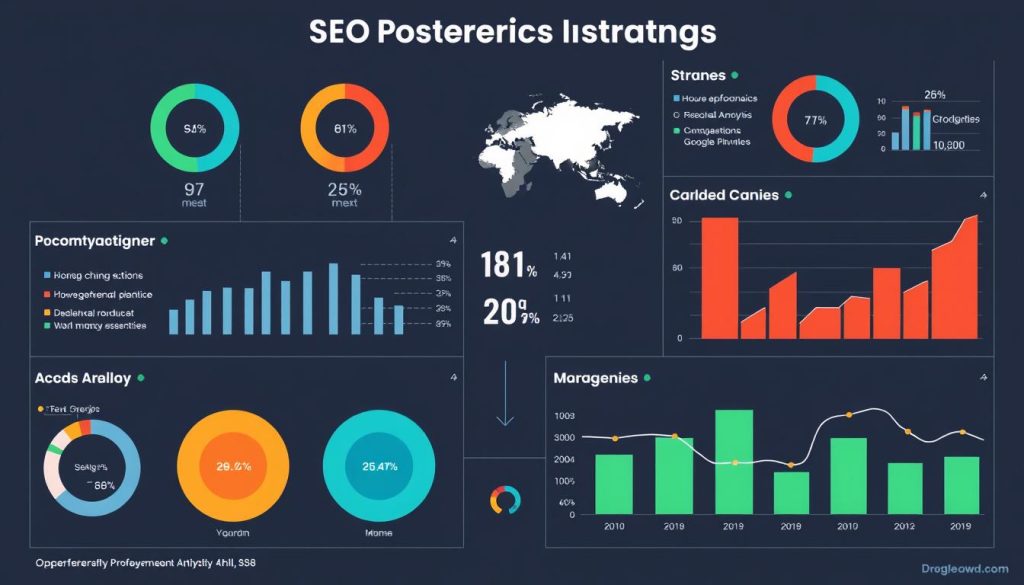In today’s digital landscape, having a strong online presence is crucial for career advancement. As a professional looking to elevate your digital marketing career, understanding search engine optimization is key. By mastering SEO best practices, you can significantly enhance your career trajectory and open up new opportunities for professional growth.
Staying current with the latest SEO techniques not only differentiates you from competitors in the job market but also positions you as an industry expert. Optimizing website content and structure can lead to measurable results, showcasing your professional value to potential employers or clients. By doing so, you can increase your visibility and reach your target audience more effectively.
Table of Contents
Key Takeaways
- Mastering SEO best practices can significantly enhance your digital marketing career.
- Understanding search engine optimization is essential for modern marketers.
- Staying current with SEO techniques can position you as an industry expert.
- Optimizing website content and structure leads to measurable results.
- Increased SEO expertise correlates with higher career opportunities and salary potential.
Understanding the Power of SEO in Today’s Digital Landscape
With the rise of online competition, mastering SEO is essential for professionals seeking to boost their careers. SEO, or Search Engine Optimization, is a set of strategies used to increase the quantity and quality of traffic to your website through organic search engine results.
The significance of SEO lies in its ability to make your site more attractive to search engines like Google, Bing, and Yahoo, thereby improving your page rankings and driving more users to your site. This, in turn, enhances your online visibility and attracts potential customers without the direct costs associated with paid advertising.
How SEO Impacts Career Growth in Digital Marketing
Mastering SEO skills can directly impact your career trajectory by making you more valuable to employers seeking professionals who can drive organic traffic and reduce paid advertising costs. Key aspects include understanding how search engine algorithms evaluate content quality and user experience.
The Evolution of Search Engine Algorithms
Search engine algorithms have evolved significantly, from simple keyword matching to sophisticated algorithms that evaluate content quality, user experience, and technical performance. Staying current with these updates is crucial for industry professionals.
Creating High-Quality Content: The Foundation of Effective SEO

To excel in SEO, it’s essential to focus on crafting high-quality content that meets the needs and interests of your audience. High-quality content is not just about filling your website with words; it’s about creating a valuable resource that resonates with your audience and addresses their queries effectively.
Developing Relevant and Valuable Content
Developing content that is both relevant and valuable to your audience is crucial. This involves understanding your audience’s needs, interests, and the keywords they use when searching online. Your content should be engaging, informative, and well-structured with headings, subheadings, and bullet points to enhance readability. By doing so, you not only improve user engagement but also increase the likelihood of your content being shared and linked back to, which is beneficial for SEO.
Implementing the Skyscraper Technique
The Skyscraper Technique is a proven method for creating content that outperforms existing content in your niche. It involves identifying successful content, then creating something even better by making it more comprehensive, up-to-date, and filled with practical guidance. This technique helps in attracting more backlinks and engagement, thereby boosting your SEO efforts. By crafting content that exceeds the existing standard, you can establish your website as a leading resource in your field.
By focusing on these strategies, you can significantly enhance your website’s SEO performance and provide real value to your audience.
Mastering Keyword Research and Optimization

Understanding and implementing the right keywords can significantly boost your SEO efforts. Keywords are the foundation of search engine optimization, helping search engines understand what your website is about. By researching and incorporating primary and secondary keywords naturally into your content, titles, meta descriptions, and URLs, you can improve your search engine rankings.
Finding and Targeting Long-Tail Keywords
Long-tail keywords are more detailed phrases that cater to niche searches, decreasing competition while aligning closely with user intent. For instance, targeting « women’s trail running shoes » instead of the highly competitive « running shoes » can yield better results. Effective keyword research identifies both high-volume terms and valuable long-tail keywords, allowing you to capture a broader audience.
Building Topic Clusters Instead of Keyword Silos
By building content around an array of interlinked topics rather than individual keywords, you can establish domain authority and capture a broader audience. This approach shifts your content strategy from keyword-focused to topic clusters, improving overall domain relevance. It ensures that your site is seen as an authority in your niche, enhancing your SEO best practices.
To master keyword research and optimization, consider the following strategies:
– Discover effective strategies for conducting comprehensive keyword research.
– Analyze search intent behind keywords to align your content with user queries.
– Understand the shift to topic clusters for improved domain authority.
– Master natural keyword integration for better readability and user experience.
– Explore tools for identifying keyword gaps and opportunities to outrank competitors.
On-Page SEO Best Practices for Maximum Visibility
Effective on-page SEO is the cornerstone of a successful digital marketing strategy. By optimizing individual web pages, you can significantly improve your website’s visibility and relevance in search engine results. This involves a combination of strategies that make your content more appealing to both users and search engines.
Crafting Effective Title Tags and Meta Descriptions
Title tags and meta descriptions are critical components of on-page SEO. Your title tag should be between 50-60 characters, including your target keyword at the beginning to boost relevance. For meta descriptions, keep them between 155-160 characters, ensuring they are informative and enticing to encourage clicks. For more detailed guidance, you can refer to our comprehensive guide on on-page SEO best practices.
Optimizing URLs and Internal Link Structure
Optimizing your URLs and internal linking structure is vital for both user experience and search engine crawling. Create clean, descriptive URLs that include target keywords. Internal linking helps distribute page authority throughout your site, creating logical pathways for users and search engines. This enhances your site’s overall SEO strategy and improves user navigation.
- Craft compelling title tags that incorporate primary keywords while remaining engaging.
- Understand optimal character counts and formatting for meta descriptions.
- Master creating clean, descriptive URLs that contribute to your SEO strategy.
- Discover effective internal linking strategies that distribute page authority.
Technical SEO Elements That Boost Your Rankings

For your website to outrank the competition, it is essential that all technical SEO aspects are finely tuned. This involves paying attention to various elements that impact your search engine rankings and user experience.
Core Web Vitals and Page Speed Optimization
Google’s Core Web Vitals is a set of metrics that measure real-world user experience for loading performance, interactivity, and the stability of content as it loads. To improve your page speed, focus on optimizing images, minifying code, leveraging browser caching, and enhancing server response times. This will not only elevate user satisfaction but also contribute to improved search engine rankings.
Implementing Structured Data and Schema Markup
By implementing structured data or schema markup on your site, you provide search engines with detailed context about the content of your pages. This added layer of information can help search engines better categorize and index your content, potentially qualifying you for rich snippets that increase your visibility in search results.
To maximize your website’s potential, ensure that you optimize your technical SEO elements. This includes improving page speed, implementing structured data, and ensuring that your site is mobile-friendly and crawlable.
Mobile Optimization: A Critical SEO Component
As the majority of internet users now access the web through mobile devices, optimizing for mobile has become a crucial aspect of SEO. Search engines like Google have recognized this shift and altered their algorithms to reward sites with mobile-first interfaces. A mobile-friendly website should have responsive design features so it can be properly displayed and easily navigated on smartphones and tablets.
Responsive Design Best Practices
Implementing responsive design is key to ensuring a seamless user experience across devices. This involves using flexible grids, images, and media queries to adapt the website’s layout to different screen sizes. By doing so, you can improve user engagement and reduce bounce rates. Some best practices include using a mobile-first approach, optimizing images, and ensuring that content is easily accessible on smaller screens.
Mobile-First Indexing Considerations
With Google’s mobile-first indexing, the search engine prioritizes the mobile version of your website when indexing and ranking. To ensure that your site maintains or improves its rankings, it’s essential to optimize for mobile by using responsive design, fast loading speeds, and easy navigation. You can check Google’s guidelines for mobile-first indexing to ensure your site meets the necessary criteria. For more information on optimizing your website, visit Boost Your Success with Website Optimization.
Enhancing User Experience for Better SEO Performance
To improve SEO performance, it’s essential to focus on creating a seamless user experience. User experience is a significant ranking factor for search engines, as it directly impacts how users interact with a website.
Improving Site Navigation and Accessibility
Improving site navigation and accessibility is crucial for a good user experience. A website with a logical layout, clear calls to action (CTAs), and fast loading times can reduce bounce rates and improve search engine rankings. Techniques such as proper heading structure, alt text for images, and keyboard navigation options can enhance website accessibility.
Reducing Bounce Rates Through Engaging Design
Reducing bounce rates can be achieved through engaging design elements, compelling content presentation, and clear CTAs. An intuitive UI/UX design facilitates easy, satisfying user interactions, which can influence a site’s credibility and ranking. For more information on improving SEO performance, visit our expert tips guide.
| Aspect | Description | SEO Benefit |
|---|---|---|
| Site Navigation | Logical layout and clear CTAs | Reduced bounce rates |
| Accessibility | Proper heading structure and alt text | Improved user experience |
| Engaging Design | Compelling content and clear CTAs | Higher engagement metrics |
Building a Strong Backlink Profile

To improve your website’s authority, focus on creating a strong foundation of high-quality backlinks. Generating backlinks is a foundational component of SEO, as it helps structure your site and spread link equity. Internal links are crucial, while external links to reputable sources add credibility to your content.
Guest Posting and Content Partnerships
Contribute valuable content to reputable sites in your niche to generate authoritative links back to your website. This strategic approach helps you reach a new audience, establish yourself as an expert, and create relationships with peers.
Broken Link Building Techniques
Broken link building involves identifying broken links on other websites and suggesting replacement content on your site. This tactic not only benefits website owners but also enhances your backlink profile.
Key Takeaways:
- Understand why quality backlinks remain a powerful ranking factor.
- Learn effective guest posting strategies for earning valuable backlinks.
- Discover how to capitalize on broken link building opportunities.
Image and Video Optimization Strategies
As search engines continue to evolve, image and video optimization play a critical role in improving your site’s search engine results. Visual content not only enhances user experience but also provides additional ranking opportunities.
Adding Descriptive Alt Text and File Names
Using descriptive alt text and file names is essential for image optimization. Alt tags, also known as « alt attributes » or « alt descriptions, » provide a concise, descriptive text that accurately reflects the content and function of an image. This not only helps visually-impaired site visitors through screen readers but also aids search engines in understanding the context and content of the image. For instance, using relevant keywords in alt text can improve image indexing. Best practices include using descriptive file names and alt text that accurately describe the image content.
Video SEO Best Practices
Optimizing videos involves several key strategies. Creating high-quality video content and embedding it on a standalone page near relevant text is crucial. Writing descriptive text in the titles and description fields of a video also enhances its visibility in search results. Moreover, using transcripts and schema markup can significantly improve video SEO. By implementing these best practices, you can increase your video’s ranking in both standard and video-specific search results. This, in turn, can drive more traffic to your site and enhance overall user engagement.
Monitoring and Analyzing SEO Performance

SEO success hinges on the ability to analyze and adjust your strategy based on performance data. Continual analysis of your website’s performance using tools like Google Analytics is essential to understand where your traffic is coming from, which pages are most popular, and the actions users are taking on your site.
Essential Metrics to Track
To measure SEO performance effectively, it’s crucial to track key metrics. These include organic traffic, conversion rates, bounce rates, average session duration, and keyword rankings. Understanding these metrics helps in identifying areas of improvement and opportunities for growth.
Using Data to Refine Your SEO Strategy
By analyzing the tracked metrics, you can refine your SEO strategies and make informed decisions. Regular website analysis is necessary, especially after search engine algorithm updates, to ensure that your traffic isn’t negatively impacted. This involves monitoring changes in rankings, organic traffic, or user behavior, and adjusting your strategy accordingly. For more insights on finding clients online, you can visit this resource.
Conclusion: Leveraging SEO Best Practices for Career Advancement
By understanding and implementing effective SEO best practices, professionals can significantly enhance their career prospects in the competitive digital landscape. Mastering search engine optimization techniques not only improves website visibility and search rankings but also demonstrates strategic thinking and technical capabilities to current and potential employers.
As you continue to develop your SEO skills, focus on creating high-quality, relevant content that enhances user experience. By doing so, you’ll not only drive business growth but also position yourself as a valuable asset in the industry. Staying current with evolving SEO trends and algorithm updates will further solidify your expertise, making you a more competitive candidate for career advancement opportunities.
FAQ
What is the importance of keyword research in SEO?
Keyword research is crucial in SEO as it helps identify relevant terms and phrases your target audience uses, enabling you to optimize your content and improve search engine rankings.
How often should I update my website’s content for better SEO performance?
Regularly updating your website’s content is essential for SEO. It’s recommended to refresh your content every few months to keep it relevant and valuable to your audience, which can improve your search engine rankings.
What is the role of internal linking in SEO?
Internal linking plays a significant role in SEO by helping search engines understand your website’s structure and content hierarchy. It also enhances user experience by facilitating navigation and providing additional relevant information.
How does mobile optimization impact SEO?
Mobile optimization is critical for SEO, as it directly affects user experience and search engine rankings. A mobile-friendly website is more likely to rank higher in search results, as it provides a better experience for the majority of users who access the web through mobile devices.
What are Core Web Vitals, and why are they important for SEO?
Core Web Vitals are a set of metrics that measure a website’s performance, including loading speed, interactivity, and visual stability. They are essential for SEO, as they directly impact user experience and are now a ranking factor in search engine algorithms.
Can you explain the concept of topic clusters in content creation?
Topic clusters involve creating a group of related content pieces that are interlinked, with a central hub page providing an overview of the topic. This approach helps search engines understand the relevance and authority of your content, improving your SEO performance.
How does image optimization contribute to overall SEO strategy?
Image optimization is a crucial aspect of SEO, as it involves adding descriptive alt text, file names, and compressing images to improve page load times. This enhances user experience and helps search engines understand the content of your images, potentially improving your rankings in image search results.
What is the significance of tracking essential metrics in SEO?
Tracking essential metrics, such as organic traffic, keyword rankings, and conversion rates, is vital in SEO, as it allows you to measure the effectiveness of your strategy, identify areas for improvement, and make data-driven decisions to refine your approach.





